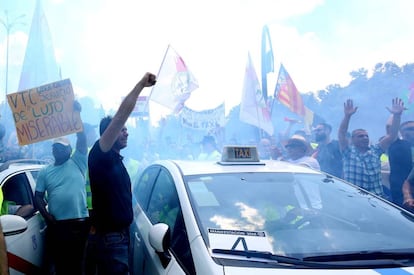As their licenses lose value, Spain’s taxi drivers fight Uber and Cabify
Nationwide strikes focus on getting the government to reduce the number of livery cars
Taxi drivers from all over Spain – 20,000 according to organizers and 6,000 according to government officials in Madrid – marched in the capital on Tuesday to protest app-based transportation services like Cabify and Uber. There were also strikes in most large cities: Barcelona was without taxis for 24 hours and Madrid for 12 hours.

The protesters have one main demand: that only one license be granted to on-demand ride service vehicles for every 30 taxi licenses. The current ratio is 64,763 taxicab licenses for 5,865 alternative livery vehicle licenses.
In Madrid, there were no taxis in sight early Tuesday morning. By 8.30am, taxi drivers were congregating outside the central Atocha train station in preparation for the noon march.
In Madrid, taxi drivers looking to retire are offering their licenses for anywhere from €150,000 to €170,000
“You roach!” some of them screamed out to passing app-based transportation vehicles easily identifiable through their red windshield stickers. Cabify kept up operations in Madrid and Barcelona on Tuesday, but Uber warned that it would not be in service because of the strike.
“Legal taxis are united across Spain. We oppose Uber and Cabify, which are toying with the bread-and-butter of over 100,000 families,” said Antonio Gil, a taxi driver from Barcelona.
At Madrid–Barajas airport, arriving tourists were stumped by the situation. Elena, a 77-year-old from Argentina, had arrived with two cousins in wheelchairs.
“At the airport they are telling us to take the subway or the bus, but we are in no condition to do that,” she said.
Krista and Guy Kaerts, from Belgium, were headed for Puerta de Alcalá area in downtown Madrid. Taxi drivers there told them to take a bus, and they did – except that the bus they caught was headed to Alcalá de Henares, a city 30 kilometers from Madrid.
At noon, thousands of taxi drivers from Bilbao, Málaga, the Balearic Islands, Barcelona, Benidorm, and even France and Belgium began a two-hour march from Atocha to the Fountain of Neptune in the Spanish capital.
Egg-citing times
There were moments of tension when the march reached its destination and six representatives handed their list of grievances to Congress. Some demonstrators hurled eggs, cans and plastic containers at the police, who had cordoned off the building. No serious incidents were reported, but there were four arrests.
Podemos leader Pablo Iglesias, who was there to greet the protesters, was splashed by an egg as it hit the face of the man standing next to him – Julio Sanz, president of the Professional Taxi Federation of Madrid.
Although he initially reacted with a stony face, Iglesias later cracked a joke about it in his Twitter account: “Me ha hecho un huevo de ilusión acompañar hoy a los taxistas en defensa de los servicios públicos y contra la privatización.” [roughly “I was very egg-cited to be with taxi drivers today to defend public services and oppose privatization.”]
Me ha hecho un huevo 🙈 de ilusión acompañar hoy a los taxistas en defensa de los servicios públicos y contra la privatización 👇 pic.twitter.com/HaW0VACAgK
— Pablo Iglesias 🔻 (@PabloIglesias) May 30, 2017
The government said it will increase inspections. “The taxi sector has to be defended; we need to find a way to increase oversight in order to have greater assurances that the legal framework is being observed,” said Public Works Minister Íñigo de la Serna on Tuesday.
César Ramos, the Socialist Party’s spokesman for public works issues in Congress, asked the government to sit down to negotiate a new framework so taxis may “compete under the same conditions.”
Falling prices
In the meantime, no new licenses are being granted, either for taxicabs or other livery vehicles. Existing licenses may be bought and sold, however, which brings up their price. Taxi licenses are around three times more expensive than livery cab licenses because chauffeured vehicles have certain limitations.
In Madrid, taxi drivers looking to retire are running ads offering their licenses for anywhere between €150,000 and €170,000. The ads for chauffeured vehicles offer licenses for around €40,000.
With the surge in app-based ride services, the price of these licenses is starting to go down, and this directly affects taxi drivers – self-employed workers who rely on the sale of their license as a retirement fund.
English version by Susana Urra.
Tu suscripción se está usando en otro dispositivo
¿Quieres añadir otro usuario a tu suscripción?
Si continúas leyendo en este dispositivo, no se podrá leer en el otro.
FlechaTu suscripción se está usando en otro dispositivo y solo puedes acceder a EL PAÍS desde un dispositivo a la vez.
Si quieres compartir tu cuenta, cambia tu suscripción a la modalidad Premium, así podrás añadir otro usuario. Cada uno accederá con su propia cuenta de email, lo que os permitirá personalizar vuestra experiencia en EL PAÍS.
¿Tienes una suscripción de empresa? Accede aquí para contratar más cuentas.
En el caso de no saber quién está usando tu cuenta, te recomendamos cambiar tu contraseña aquí.
Si decides continuar compartiendo tu cuenta, este mensaje se mostrará en tu dispositivo y en el de la otra persona que está usando tu cuenta de forma indefinida, afectando a tu experiencia de lectura. Puedes consultar aquí los términos y condiciones de la suscripción digital.








































